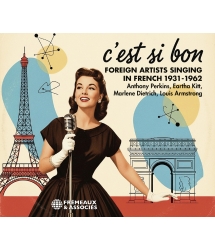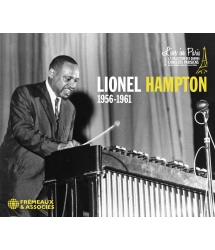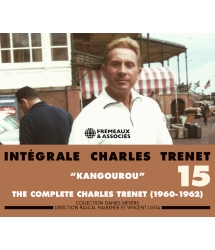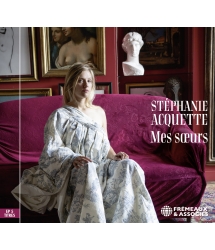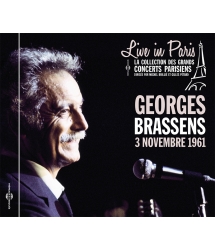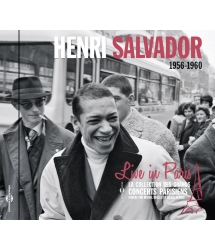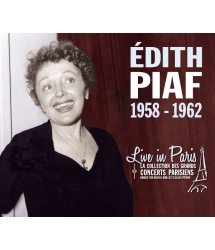- Our Catalog
- Philosophy
- Philosophers of the 20th century and today
- History of Philosophy (PUF)
- Counter-History and Brief Encyclopedia by Michel Onfray
- The philosophical work explained by Luc Ferry
- Ancient thought
- Thinkers of yesterday as seen by the philosophers of today
- Historical philosophical texts interpreted by great actors
- History
- Books (in French)
- Social science
- Historical words
- Audiobooks & Literature
- Our Catalog
- Jazz
- Blues
- Rock - Country - Cajun
- French song
- World music
- Africa
- France
- Québec / Canada
- Hawaï
- West Indies
- Caribbean
- Cuba & Afro-cubain
- Mexico
- South America
- Tango
- Brazil
- Tzigane / Gypsy
- Fado / Portugal
- Flamenco / Spain
- Yiddish / Israel
- China
- Tibet / Nepal
- Asia
- Indian Ocean / Madagascar
- Japan
- Indonesia
- Oceania
- India
- Bangladesh
- USSR / Communist songs
- World music / Miscellaneous
- Classical music
- Composers - Movie Soundtracks
- Sounds of nature
- Our Catalog
- Youth
- Philosophy
- News
- How to order ?
- Receive the catalog
- Manifesto
- Dictionnary











- Our Catalog
- Philosophy
- Philosophers of the 20th century and today
- History of Philosophy (PUF)
- Counter-History and Brief Encyclopedia by Michel Onfray
- The philosophical work explained by Luc Ferry
- Ancient thought
- Thinkers of yesterday as seen by the philosophers of today
- Historical philosophical texts interpreted by great actors
- History
- Books (in French)
- Social science
- Historical words
- Audiobooks & Literature
- Our Catalog
- Jazz
- Blues
- Rock - Country - Cajun
- French song
- World music
- Africa
- France
- Québec / Canada
- Hawaï
- West Indies
- Caribbean
- Cuba & Afro-cubain
- Mexico
- South America
- Tango
- Brazil
- Tzigane / Gypsy
- Fado / Portugal
- Flamenco / Spain
- Yiddish / Israel
- China
- Tibet / Nepal
- Asia
- Indian Ocean / Madagascar
- Japan
- Indonesia
- Oceania
- India
- Bangladesh
- USSR / Communist songs
- World music / Miscellaneous
- Classical music
- Composers - Movie Soundtracks
- Sounds of nature
- Our Catalog
- Youth
- Philosophy
- News
- How to order ?
- Receive the catalog
- Manifesto
- Dictionnary
LIVE IN PARIS 1960-1961(CONTIENT INÉDITS)
Jacques Brel
Ref.: FA5650
EAN : 3561302565026
Label : Frémeaux & Associés
Total duration of the pack : 1 hours 15 minutes
Nbre. CD : 1
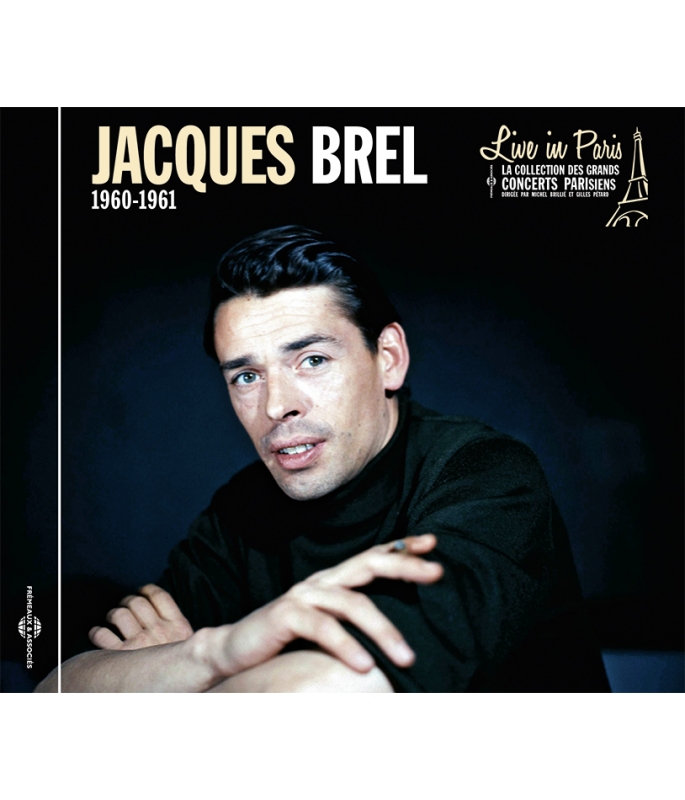
LIVE IN PARIS 1960-1961(CONTIENT INÉDITS)
LIVE IN PARIS 1960-1961(CONTIENT INÉDITS)
Jacques Brel is one of the most illustrious names in French song. These live recordings, some of which have never been available on record before, superbly underline this singer’s wonderful sense of performance as he puts all his energy into displaying a legendary spirit. His stage performances were timeless occasions that showed his inborn feeling for words that accompanied an unequalled breath of liberty. Patrick FRÉMEAUX
The Live in Paris collection by Michel Brillié allows listeners to hear previously-unreleased recordings (made at concerts and private- or radio-sessions) by the great 20th stars in jazz, rock & roll and song. These “live” takes, and the artists’ rapport with their audiences, gives these performances an additional soul and sensibility in counterpoint to the rigorous demands of studio recordings. Particular care was taken when restoring the sound of these tapes in order to meet CD standards while preserving the original colours of the period. Patrick FRÉMEAUX & Gilles PÉTARD
-
PisteTitleMain artistAutorDurationRegistered in
-
1Les prénoms de ParisJacques BrelJacques Brel00:02:171961
-
2RosaJacques BrelJacques Brel00:02:441961
-
3Le plat paysJacques BrelJacques Brel00:02:551961
-
4BruxellesJacques BrelJacques Brel00:02:531961
-
5Les paumés du petit matinJacques BrelJacques Brel00:03:501961
-
6La statueJacques BrelJacques Brel00:03:091961
-
7Les bourgeoisJacques BrelJacques Brel00:02:521961
-
8MariekeJacques BrelJacques Brel00:02:271961
-
9MadeleineJacques BrelJacques Brel00:02:391961
-
10Les bichesJacques BrelJacques Brel00:03:301961
-
11ZangraJacques BrelJacques Brel00:03:121961
-
12Le caporal casse-pomponJacques BrelJacques Brel00:02:291961
-
13L'ivrogneJacques BrelJacques Brel00:03:421961
-
14La valse à mille tempsJacques BrelJacques Brel00:03:531961
-
15Ne me quitte pasJacques BrelJacques Brel00:03:381961
-
16Le moribondJacques BrelJacques Brel00:03:171961
-
17Quand on n'a que l'amourJacques BrelJacques Brel00:02:561961
-
18SeulJacques BrelJacques Brel00:03:351960
-
19La dame patronnesseJacques BrelJacques Brel00:02:481960
-
20Les singesJacques BrelJacques Brel00:03:591960
-
21Ne me quitte pas 2Jacques BrelJacques Brel00:03:481960
-
22L'air de la bêtiseJacques BrelJacques Brel00:03:361960
-
23La colombeJacques BrelJacques Brel00:02:261960
-
24Quand on a que l'amour 2Jacques BrelJacques Brel00:03:081960
Brel Live FA5650
Live in Paris
La collection des grands concerts parisiens
Dirigée par Michel Brillié et Gilles Pétard
Jacques Brel
1960-1961
Par Martin Pénet
La carrière de Brel est indissociable de la scène, où il vivait ses chansons avec une intensité qui défie les règles de l’interprétation et bouscule volontiers la bienséance. Faut-il s’étonner, dans ces conditions, que l’une de ses plus célèbres œuvres, Amsterdam, n’existe qu’en version publique à l’Olympia en 1964 ? Ou bien que plusieurs de ses enregistrements sur cette scène mythique précèdent les versions studio ? On observe ainsi le travail d’intériorisation des textes qui permet de livrer ensuite en studio des versions parfaitement maîtrisées – à rebours de ce qui se pratique le plus souvent de nos jours, où l’album d’un chanteur doit être prêt pour se vendre à la sortie des concerts…
L’histoire moderne de l’Olympia, lieu de spectacles mythique au cœur de Paris, démarre en février 1954, lorsque Bruno Coquatrix rend la salle de cinéma à sa vocation originelle de music-hall. Les noms qui ornent ses premières affiches sont les vedettes de la chanson du moment : Gilbert Bécaud, Lucienne Delyle, Georges Brassens, Eddie Constantine, Charles Trenet, Léo Ferré, Joséphine Baker, Juliette Gréco, Dario Moreno, Jean Sablon… La relation de Jacques Brel à l’Olympia débute dès juillet 1954 lorsqu’il passe en supplément de programme de Damia. Mais autant le dire d’emblée : il n’a aucun succès et devra attendre plusieurs années avant de retenter l’expérience.
Arrivé à Paris depuis moins d’un an, à l’automne 1953, il est pour l’heure un habitué du Théâtre des Trois Baudets – où l’a appelé son directeur Jacques Canetti – et des cabarets de la rive gauche ou de Montmartre. Avec un répertoire de sa composition marqué par une éducation bruxelloise traditionnelle, entre école catholique et scoutisme, il se forme auprès du public de proximité et n’est pas encore mûr pour les grandes scènes. Engagé chez Philips en février 1954, il y grave une dizaine de titres avec l’orchestre d’André Grassi qui sortiront de façon échelonnée jusqu’à l’année suivante.
Début 1955, davantage exercé au contact du public, il chante pour la première fois dans des salles de taille intermédiaire : Bobino à Paris et l’Ancienne Belgique à Bruxelles. Il participe en outre aux tournées d’été organisées par Jacques Canetti. C’est là qu’il fait en 1956 la connaissance de François Rauber, jeune pianiste classique qui gagne sa vie grâce à la chanson. Ce dernier devient son accompagnateur et une amitié naît entre les deux hommes. Rauber s’inscrit dans l’univers de Brel et lui donne la formation musicale qui lui manque?; il signera même la musique de plusieurs de ses chansons. A l’automne, le chanteur effectue des séances d’enregistrement avec l’orchestre d’André Popp dont les titres sortiront l’année suivante.
Jacques Brel se produit en février 1957 en première partie de Zizi Jeanmaire à l’Alhambra de Paris, vaste salle de la rue de Malte aujourd’hui disparue. Son titre phare, Quand on a que l’amour est gravé peu après avec l’orchestre d’André Popp et marque le début de sa popularité à la radio. Brel fait de plus en plus de tournées et se perfectionne sur scène. En novembre, il fait la connaissance du pianiste Gérard Jouannest, qui composera par la suite la musique de bon nombre de ses chansons. En 1958, François Rauber succède à André Popp et devient l’arrangeur attitré de Brel pour ses séances d’enregistrement.
Le chanteur attendra le mois de novembre 1958 pour revenir à l’Olympia, quatre ans après sa première apparition?; il est cette fois en vedette américaine de Philippe Clay. Il s’est laissé convaincre par François Rauber d’abandonner la guitare qui l’emprisonnait et le public reconnaît enfin en lui un véritable homme de scène.
En mars 1959, Jacques Brel passe en vedette aux Trois Baudets avec un débutant nommé Serge Gainsbourg. Son succès va grandissant et les tournées se succèdent à un rythme soutenu. Gérard Jouannest devient son pianiste exclusif sur scène ; tandis que François Rauber, qui ne peut assurer autant de tournées, ne s’occupe plus que des concerts parisiens et prend en charge toutes les séances d’enregistrement.
Après avoir longuement travaillé son chant et sa voix, Brel réussit désormais à maîtriser à la fois son art et sa forte personnalité. Libéré de la guitare, il écrit des chansons plus scéniques?; ses textes commencent à prendre un ton amer, une force critique et corrosive qui contraste avec les chansons plus idéalistes de ses débuts. En novembre 1959, il chante successivement à Bobino (en tête d’affiche et en remplacement de Francis Lemarque), puis à l’Ancienne Belgique.
1960 est une année charnière : Charley Marouani devient l’impresario de Jacques. Il lui organise de nombreuses tournées nationales et internationales, notamment au Moyen-Orient. Le chanteur brûle alors la vie par tous les bouts : après ses concerts, il entraîne ses amis jusqu’à l’aube dans de longues équipées assez arrosées. Entre tournées, nuits blanches, tabac, alcool et conquêtes féminines, il mène un rythme épuisant. Les titres captés à la foire de Douai en septembre 1960 constituent un précieux témoignage de ces tournées marathon. Brel triomphe avec Ne me quitte pas (créé l’année précédente), puis fait preuve dans L’air de la bêtise de ses qualités de comédien et de remarquables qualités vocales, proches du lyrique, avec une citation de Barbier de Séville de Rossini.
En janvier 1961, Jacques Brel revient à Bobino. Il ajoute à son accompagnement de scène l’accordéon de Jean Corti, lequel composera la musique de plusieurs de ses chansons. En mars, une tournée au Canada le fait connaître du public de Montréal. Du 12 au 29 octobre, il est engagé à l’Olympia pour remplacer Marlène Dietrich. Le récital qu’il y donne est un véritable triomphe : Brel est consacré par le public et par la critique. Accompagné à deux pianos par Jouannest et Rauber, sa présence scénique, impétueuse, est étonnante. Avec une technique gestuelle très au point, il parvient désormais à paraphraser ses propres textes, à les amplifier, voire les caricaturer. Outre ses chansons récemment sorties chez Philips (Le moribond, Marieke, Les prénoms de Paris), il crée à cette occasion plusieurs titres qu’il ne gravera en studio que l’année suivante : Les bourgeois, Les paumés du petit matin, Bruxelles et Le plat pays. Parmi ses chansons plus anciennes, il reprend Ne me quitte pas, La valse à mille temps et enfin Quand on n’a que l’amour.
Brel est désormais une immense vedette, à l’égal de Brassens, Ferré ou Piaf. Il reprend ses tournées à un rythme infernal, qui ne cesse de s’accélérer, au point qu’il songe déjà à arrêter la scène (ce qu’il fera finalement en mai 1967, après quinze ans à peine de métier). Pour l’heure, il atteint un record du nombre de spectacles par an.
L’enregistrement du concert Olympia 1961 sort chez Philips. Mais Brel signe en mars 1962 un contrat chez Barclay et grave aussitôt les versions studio de plusieurs titres lancés à l’Olympia?; y figure notamment Le plat pays, vibrant hommage à sa terre natale avec laquelle il n’a jamais rompu. En effet, beaucoup de ses chansons sont des croquis inspirés par sa jeunesse bruxelloise. Sa belgitude affirmée sur les scènes françaises en fait paradoxalement l’un des plus célèbres chanteurs de l’espace francophone.
Martin PÉNET
© FRÉMEAUX & ASSOCIÉS 2016
Spécialiste de la chanson française, Martin Pénet est journaliste, producteur (France Musique, France Culture) et historien. Il est l’auteur de plusieurs ouvrages et a réalisé de nombreuses anthologies patrimoniales en CD, dont l’intégrale Marie Dubas (FA053) avec François Bellair chez Frémeaux & Associés.
Jacques Brel – Live in Paris 1960-1961
By Martin Pénet
The career of Jacques Brel is inseparable from the stage, where he lived his songs with an intensity that defied the rules of performance, gladly shaking up notions of propriety. So, should it come as a surprise to learn that a performance of Amsterdam for a live audience — one of his most famous songs — only exists in this 1964 recording at the Olympia? Or that several recordings he made on the same legendary stage date from before the studio versions? You can observe how Brel was working here; the lyrics and texts of his songs were elaborated and made more introspective during his concerts, and this allowed him to go into the studio with songs that he’d mastered: he knew them to perfection. This, of course, is the opposite of what often happens nowadays: a singer’s album has to be manufactured and already on sale by the time the concert is over…
The modern history of the Olympia, a legendary venue in the heart of Paris, began in February 1954 when Bruno Coquatrix returned it — it was then a cinema — to its original vocation as a music hall. The names that appeared on its posters were song stars of the moment, from Gilbert Bécaud to Lucienne Delyle, and also Georges Brassens, Eddie Constantine, Charles Trenet, Léo Ferré, Josephine Baker, Juliette Greco, Dario Moreno or Jean Sablon… But Jacques Brel’s relationship with the Olympia dates from July 1954 when he appeared as an addition to the show given by Damia. And you might as well learn that Brel wasn’t a success at all… in fact, he had to wait for several years before he attempted the Olympia experience again.
He’d been in Paris for less than a year (since the autumn of 1953), and for the moment he was a regular sight at the Trois Baudets theatre – to which he’d been summoned by its director, Jacques Canetti – and in various Left Bank cabarets or else in Montmartre. Singing a repertoire made up of his own compositions and influenced by a traditional Brussels education somewhere between a Catholic schooling and the Boy Scouts, Brel learned his trade with local audiences and wasn’t yet ready for major theatres. He was given a contract by Philips in February 1954, and recorded ten titles for that label with the orchestra of André Grassi; these titles would be released in batches from time to time until the following year.
By early 1955, with more practice at appearing in front of an audience, Brel was singing for the first time in mid-sized venues that included Bobino in Paris and the Ancienne Belgique theatre in Brussels. He also began taking part in summer tours that were organized by Jacques Canetti, and it was during one of the latter (in 1956) that he made the acquaintance of François Rauber, a young, classically trained pianist who was earning a living thanks to the world of song. Rauber became his accompanist and the two men went on to be close friends. Rauber joined the universe of Brel and gave him the musical apprenticeship he lacked; he would even write the music for several of Brel’s songs. That autumn, the singer began a series of recording-sessions — with an orchestra led by André Popp — whose titles would be released the following year.
In February 1957 Jacques Brel appeared for the first half of a concert starring Zizi Jeanmaire that took place at the Alhambra in Paris, a huge theatre in the rue de Malte that no longer exists today. The celebrated title Quand on a que l’amour was recorded shortly afterwards (with André Popp and his orchestra), and it marked the beginning of Brel’s popularity on radio. He toured more and more extensively, perfecting his stage routine, and then in November he met the pianist Gérard Jouannest, who would later compose the music for a good number of Brel’s songs. In 1958, François Rauber succeeded André Popp as Brel’s arranger for recording purposes.
The singer would have to wait until November 1958 before returning to the Olympia, four years after his first appearance there, and this time he opened for Philippe Clay. A notable feature of his return was that François Rauber had persuaded him to abandon the guitar that imprisoned him, and now the public would finally see Brel as the true stage artist he was.
Jacques Brel starred at the Trois Baudets in March 1959, and he appeared with a newcomer named Serge Gainsbourg. Brel’s success grew yet again and more tours followed. Gérard Jouannest became Brel’s exclusive pianist onstage; as for François Rauber, who couldn’t play on so many tour-dates, he would devote himself to all the recording-sessions and the concerts that Brel gave in Paris.
After working on his voice and songs for so long, Brel now mastered his art and could control his strong personality. Freed of the guitar, he began writing songs that had greater theatricality; his texts also took on a more bitter tone, with a corrosive, critical strength that contrasted with the idealism to be heard in his early works. In November 1959, he sang successively at Bobino (topping the bill, he replaced Francis Lemarque), and then at the Ancienne Belgique.
1960 was a pivotal year. Charley Marouani became Brel’s manager and he set up numerous tours both in France and abroad, notably in the Middle East. Brel was now burning the candle of life at both ends: after concerts, he and his friends would go out carousing until dawn, and between tours he maintained an exhausting pace composed of sleepless nights, cigarettes, alcohol and womanizing. The titles recorded at the Douai fair in September 1960 provide valuable testimony to his marathon tours. He scored a huge hit with Ne me quitte pas (a song he’d first performed the previous year), and then demonstrated his acting talents with L’air de la bêtise, which also confirmed Brel’s remarkable gifts as a vocalist close to the opera, and included an excerpt from Rossini’s Barber of Seville.
In January 1961, Jacques Brel returned to Bobino, adding to his accompaniment onstage the accordion of Jean Corti, who would pen several of Brel’s songs. The singer’s Canadian tour in March brought him to the attention of the audience in Montreal. From October 12 to 29 he was booked into the Olympia as a replacement for Marlene Dietrich, and the series of concerts he gave was a triumph: both the critics and the public consecrated him as a star of song. Accompanied by the two pianos of Jouannest and Rauber, Brel astounded audiences with his impetuous stage presence. His stage movements and gesturing were perfect, to the point where he could even paraphrase his own texts, amplifying them so that they became almost caricatures. Apart from the songs that had been recently released by Philips, he also gave first performances of Le moribond, Marieke, and Les prénoms de Paris, plus several titles that he would not record in a studio until the following year, among them Les bourgeois, Les paumés du petit matin, Bruxelles and Le plat pays. Less-recent songs included a new reading of Ne me quitte pas, La valse à mille temps, and finally Quand on n’a que l’amour.
Brel was now an immense star, the equal of Brassens, Ferré or Piaf. He went back on tour, giving concerts at an incredible pace that continually accelerated until he finally had to face the possibility of giving up the stage… and he finally did that in May 1967, after a career lasting barely fifteen years. For the time being, however, the number of concerts he gave in a year was a record.
Philips would publish the recording of this 1961 Olympia concert. But in March 1962 Brel signed a contract with Barclay Records and immediately went into the studios to record several titles that had been first heard at the Olympia. Among them, notably, was Le plat pays, a vibrant homage to his native country Belgium (to which he’d always remained attached). Brel’s songs formed a sketchbook partly inspired by his childhood in Brussels, and on French stages — a paradox — the very fact that he was Belgian made him one of the most famous singers in the French-speaking world.
Martin PÉNET
Adapted into English by Martin DAVIES
© FRÉMEAUX & ASSOCIÉS 2016
A specialist in French Song, Martin Pénet is a journalist, radio producer (France Musique, France Culture) and historian. He has written numerous works on the subject and compiled many anthologies dealing with France’s national heritage, among them the Complete Marie Dubas (FA053) with François Bellair for Frémeaux & Associés.
?1. Les prénoms de Paris (Jacques Brel - Gérard Jouannest) 2’17
?2. Rosa (Jacques Brel) 2’44
?3. Le plat pays (Jacques Brel) 2’55
?4. Bruxelles (Jacques Brel - Jacques Brel / Gérard Jouannest) 2’53
?5. Les paumés du petit matin (Jacques Brel) 3’50
?6. La statue (Jacques Brel - Jacques Brel / François Rauber) 3’09
?7. Les bourgeois (Jacques Brel - Jean Corti) 2’52
?8. Marieke (Jacques Brel - Gérard Jouannest) 2’27
?9. Madeleine (Jacques Brel - Jacques Brel / Gérard Jouannest / Jean Corti) 2’39
10. Les biches (Jacques Brel - Gérard Jouannest) 3’30
11. Zangra (Jacques Brel) 3’12
12. Le caporal Casse-Pompon (Jacques Brel) 2’29
13. L’ivrogne (Jacques Brel - Gérard Jouannest / François Rauber) 3’42
14. La valse à mille temps (Jacques Brel) 3’53
15. Ne me quitte pas (Jacques Brel) 3’38
16. Le moribond (Jacques Brel) 3’17
17. Quand on n’a que l’amour (Jacques Brel) 2’56
18. Seul (Jacques Brel) 3’35
19. La dame patronnesse (Jacques Brel) 2’48
20. Les singes (Jacques Brel) 3’59
21. Ne me quitte pas (Jacques Brel) 3’48
22. L’air de la bêtise (Jacques Brel) 3’36
23. La colombe (Jacques Brel) 2’26
24. Quand on a que l’amour (Jacques Brel) 3’08
Recorded by:
Europe N°1 Technical Staff
Recording Date:
Tracks 1 to 17: October 1961
Tracks 18 to 24: September 10, 1960
Recording Place:
Tracks 1 to 17: Olympia Theater, Paris France
Tracks 18 to 24: Foire de Douai, Douai, France
Produced by:
Bruno Coquatrix & Lucien Morisse (Tracks 1 to 17)
All tracks unreleased versions except 1, 10, 11.
Personnel:
Jacques Brel, vocal
Gérard Jouannest, piano
François Rauber, piano, conductor
Jean Corti, Accordion
Tracks 1 to 17: Olympia Ochestra
conducted by Daniel Janin
Philippe Combelle, drums ( probably tracks 18 to 24)
Pierre Sim, bass ( probably tracks 18 to 24)
Dedicated to Claude Boquet, Bill Dubois,
Jean Claude, Philippe Moch and the gang
La collection Live in Paris :
Collection créée par Gilles Pétard
pour Body & Soul
et licenciée à Frémeaux & Associés.
Direction artistique et discographie :
Michel Brillié, Gilles Pétard.
Coordination : Augustin Bondoux.
Conception : Patrick Frémeaux,
Claude Colombini.
Fabrication et distribution :
Frémeaux & Associés.
Jacques Brel est l’une des plus illustres figures de la chanson française. Ces enregistrements live, dont certains sont inédits sur disque, soulignent à merveille le formidable sens d’interprétation du chanteur qui déploie avec énergie sa fougue légendaire. Une prestation scénique intemporelle, un sens du verbe inné, un vent de liberté sans égal.
Patrick FRÉMEAUX
Jacques Brel is one of the most illustrious names in French song. These live recordings, some of which have never been available on record before, superbly un?derline this singer’s wonderful sense of performance as he puts all his energy into displaying a legendary spirit. His stage performances were timeless occasions that showed his inborn feeling for words that accompanied an unequalled breath of liberty.
Patrick FRÉMEAUX
La collection Live in Paris, dirigée par Michel Brillié, permet de retrouver des enregistrements inédits (concerts, sessions privées ou radiophoniques), des grandes vedettes du jazz, du rock & roll et de la chanson du XXe siècle. Ces prises de son live, et la relation avec le public, apportent un supplément d’âme et une sensibilité en contrepoint de la rigueur appliquée lors des enregistrements studios. Une importance singulière a été apportée à la restauration sonore des bandes, pour convenir aux standards CD tout en conservant la couleur d’époque.
Patrick FRÉMEAUX & Gilles PÉTARD
The Live in Paris collection by Michel Brillié allows listeners to hear previously-unreleased recordings (made at concerts and private- or radio-sessions) by the great 20th stars in jazz, rock & roll and song. These “live” takes, and the artists’ rapport with their audiences, gives these performances an additional soul and sensibility in counterpoint to the rigorous demands of studio recordings. Particular care was taken when restoring the sound of these tapes in order to meet CD standards while preserving the original colours of the period.
Patrick FRÉMEAUX & Gilles PÉTARD
